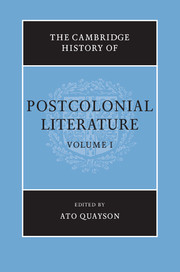Book contents
- Frontmatter
- 1 Introduction: postcolonial literature in a changing historical frame
- 2 Postcolonial fictions of slavery
- 3 Postcolonialism and travel writing
- 4 Missionary writing and postcolonialism
- 5 Postcolonial auto/biography
- 6 Orality and the genres of African postcolonial writing
- 7 Canadian literatures and the postcolonial
- 8 Postcolonialism and Caribbean literature
- 9 Postcolonialism and Arab literature
- 10 Postcolonialism and postcolonial writing in Latin America
- 11 Postcolonial writing in South Africa
- 12 Postcolonial literature in Southeast Asia
- 13 Postcolonial South Asian poetry
- 14 Postcolonial writing in India
- 15 Postcolonial writing in Australia and New Zealand
- 16 Indigenous writing in Canada, Australia and New Zealand
- 17 Postcolonial writing in Ireland
- 18 Postcolonial writing in Britain
- 19 Postcolonial writing in France
- 20 Postcolonial writing in Germany
- References
15 - Postcolonial writing in Australia and New Zealand
Published online by Cambridge University Press: 28 January 2012
- Frontmatter
- 1 Introduction: postcolonial literature in a changing historical frame
- 2 Postcolonial fictions of slavery
- 3 Postcolonialism and travel writing
- 4 Missionary writing and postcolonialism
- 5 Postcolonial auto/biography
- 6 Orality and the genres of African postcolonial writing
- 7 Canadian literatures and the postcolonial
- 8 Postcolonialism and Caribbean literature
- 9 Postcolonialism and Arab literature
- 10 Postcolonialism and postcolonial writing in Latin America
- 11 Postcolonial writing in South Africa
- 12 Postcolonial literature in Southeast Asia
- 13 Postcolonial South Asian poetry
- 14 Postcolonial writing in India
- 15 Postcolonial writing in Australia and New Zealand
- 16 Indigenous writing in Canada, Australia and New Zealand
- 17 Postcolonial writing in Ireland
- 18 Postcolonial writing in Britain
- 19 Postcolonial writing in France
- 20 Postcolonial writing in Germany
- References
Summary
Coordinates
A literary history of ‘postcolonial’ Australia and New Zealand is immediately confounded by the question of periodization, since although both ex-colonies long ago achieved formal independence from the British Empire, via Australian Federation in 1901, and New Zealand ‘dominion’ status in 1907, in 2009 the Queen remains the head of both states, and it was only relatively recently that anything like a postcolonial sensibility took root in the literary intelligentsia. As settler societies, whose dominant populations were those of British descent and whose nationalist values were deeply informed by many years of imperial rule, in the decades following their constitutional breaks from empire, both Australia and New Zealand generated literary cultures more properly described as neo-colonial or ‘late’ imperial. That is to say, these literary cultures pursued their objectives within the general structures already determined by British cultural gatekeepers, for the simple reasons that a viable local publishing industry was impossible in Australia until the 1970s and deeply fraught in New Zealand (always the more literate nation) until the 1950s, and that the great mass of published material available in either country was British. There can be little dispute that in the collective effort to establish a national literature, written in the English language but attuned to local realities and rising patriotic passions, each country had already begun, even prior to the politically decolonizing moves of the early twentieth century, to ‘decolonize’ its cultural matrix, to prepare a workable set of discourses, myths, genres and characters adequate to the postcolonial moment and capable of steering a new nation into conscious self-affirmation.
- Type
- Chapter
- Information
- The Cambridge History of Postcolonial Literature , pp. 446 - 483Publisher: Cambridge University PressPrint publication year: 2012
References
- 1
- Cited by



